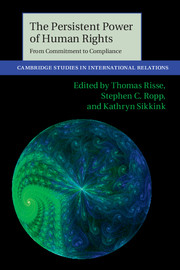Book contents
- Frontmatter
- Contents
- Figures
- Tables
- Contributors
- Preface
- Part I Introduction and stock-taking
- Part II Conceptual and methodological issues
- 4 Human rights in areas of limited statehood
- 5 The “compliance gap” and the efficacy of international human rights institutions
- 6 Social mechanisms to promote international human rights
- Part III From ratification to compliance
- Part IV From commitment to compliance
- References
- Index
5 - The “compliance gap” and the efficacy of international human rights institutions
Published online by Cambridge University Press: 05 March 2013
- Frontmatter
- Contents
- Figures
- Tables
- Contributors
- Preface
- Part I Introduction and stock-taking
- Part II Conceptual and methodological issues
- 4 Human rights in areas of limited statehood
- 5 The “compliance gap” and the efficacy of international human rights institutions
- 6 Social mechanisms to promote international human rights
- Part III From ratification to compliance
- Part IV From commitment to compliance
- References
- Index
Summary
A central question in International Relations is how international institutions influence sovereign behavior. The Power of Human Rights (PoHR), edited by Thomas Risse, Stephen Ropp and Kathryn Sikkink (1999), has helped shape this research agenda by highlighting the mechanisms by which international institutions generate domestic effects. Together with a number of other contributions in the literature, it has refreshed our thinking on how international instruments can be useful tools not just for states but also (under certain circumstances) for non-state actors – domestic or transnational – that wish to influence governments. Indeed, study of the domestic effects of international institutions has been one of the most active areas of research in the past ten years.
While much of this scholarship has focused primarily on how international institutions matter, the realist challenge persists: despite an increasing number of ways in which international institutions can influence states’ behavior, do international institutions really matter? Do international institutions – particularly those that lack enforcement power in the areas of environmental and human rights politics – really alter states’ behavior? In the area of human rights policies, recent empirical studies suggest that international human rights treaties are often too weak to induce states’ compliance (Hafner-Burton and Tsutsui 2007; Hathaway 2002; Keith 1999). More strikingly, they suggest that, while states increasingly endorse international norms, their actual behavior by and large does not conform to these norms. They further argue that the compliance gap has persisted and, in some cases, even widened over the past thirty years (Hafner-Burton and Ron 2009). To many people, this persistent and possibly growing gap between commitment and compliance calls into question the efficacy of international human rights law and institutions. The resulting policy proposals tend to emphasize enforcement and coercion rather than the “toothless” international law.
- Type
- Chapter
- Information
- The Persistent Power of Human RightsFrom Commitment to Compliance, pp. 85 - 102Publisher: Cambridge University PressPrint publication year: 2013
- 15
- Cited by



